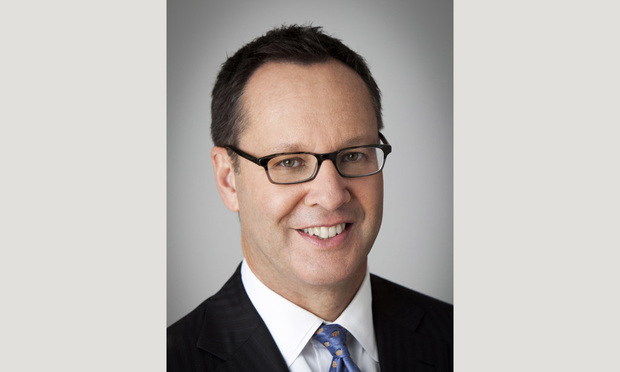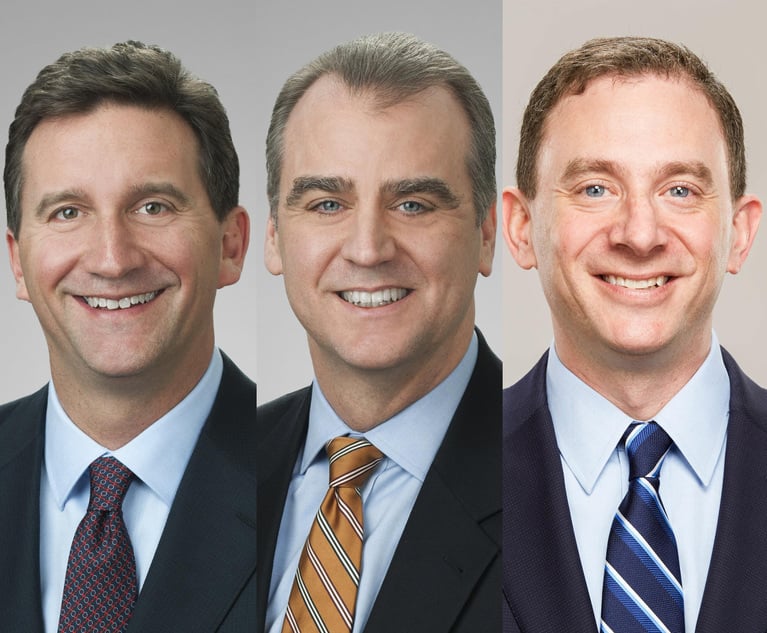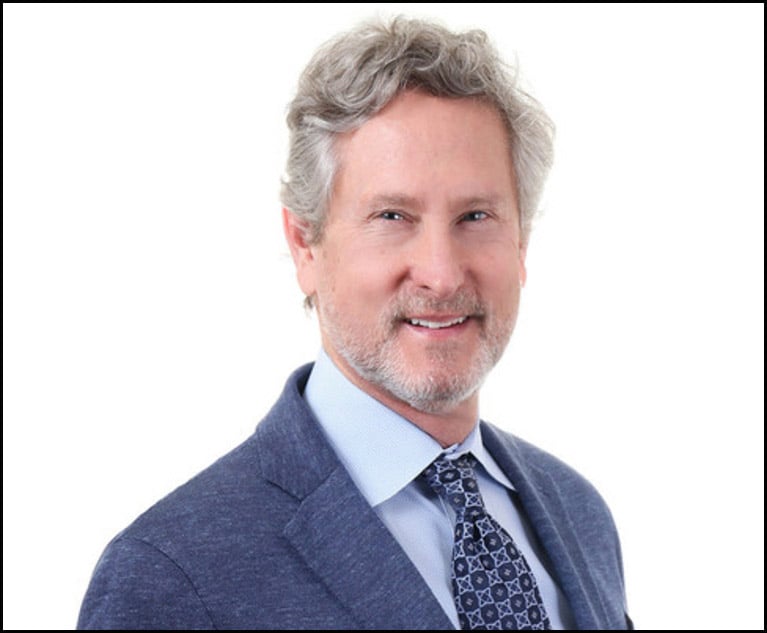Litigator of the Week: How Quinn Emanuel's Lyle Killed a $120M Suit—and Came Out $20M Ahead
Express Scripts faced a $120 million breach of contract claim by compounding pharmacy HM. Lyle and co-counsel from Husch Blackwell not only defeated the suit, they won a $20 million counter-claim.
February 01, 2019 at 11:53 AM
9 minute read
 Michael Lyle, with Quinn Emanuel.
Michael Lyle, with Quinn Emanuel.Our Litigator of the Week is Quinn Emanuel Urquhart & Sullivan's Michael Lyle, who notched an emphatic win on behalf of Express Scripts after four years of litigation in U.S. District Court for the Eastern District of Missouri.
Lyle's client faced a $120 million breach of contract suit by compounding pharmacy HM, which was represented by Boies Schiller Flexner. Not only did Lyle, who serves as co-managing partner of Quinn Emanuel's Washington, D.C. office, lead a team in defeating the breach of contract claim, he also won a $20 million counter-claim, plus a nice chunk of the defense's legal fees and costs.
He discussed the case with Lit Daily.
Lit Daily: Who is your client and what was at stake?
Michael Lyle: Our client is Express Scripts, Inc., one of the largest pharmacy benefit management companies in the United States. Express Scripts' mission is to make prescription drugs safer and more affordable for the millions of people who are members of health plans that use Express Scripts' services.
One of the ways it does this is by maintaining a network of retail pharmacies who agree to abide by certain contractual requirements, including an agreement to collect copayments from members and charge actual—not inflated—medication costs.
The stakes were high. HM Compounding sued Express Scripts for $120 million, claiming that Express Scripts wrongfully terminated its provider agreement and threw HM Compounding out of its network as part of a conspiracy against compounding pharmacies.
Express Scripts counterclaimed for $20 million, alleging HM Compounding failed to collect copayments and artificially inflated medication costs in breach of its contract with Express Scripts.
More globally, Express Scripts' right to protect the integrity and safety of its retail provider network, as well as its right to terminate pharmacies from that network for breach of their contractual obligations were also at stake.
Express Scripts didn't pick this fight. What were the circumstances that gave rise to the suit, and what were HM's primary allegations?
This was one of several cases filed by different compounding pharmacies against Express Scripts. The issues began in 2013, when Express Scripts observed massive increases in the cost of compound medications.
Compounding pharmacies were grossly inflating the costs they were charging for “customized” medications in order to maximize payments from health plans. We're talking about charging thousands of dollars for an 8oz tube of pain cream that was essentially the pharmaceutical equivalent of Bengay.
In order to induce patients to fill (or continue refilling) the prescription, compound pharmacies were waiving or simply not collecting the often high-dollar copays that were associated with these expensive medications in order to gin up sales. Imagine walking up to a prescription counter and being asked to pay a $1000 copay—if the compound pharmacy actually attempted to collect the copay, they would have lost the sale (and the millions of dollars in reimbursements from health plans).
When Express Scripts identified the conduct at HM Compounding (and some other compounding pharmacies), it investigated the pharmacy and terminated it from its network. Some of the pharmacies, like HM Compounding, sued under antitrust and breach of contract theories, alleging that Express Scripts had improperly terminated the contracts as part of a larger conspiracy to stamp out compounding practices.
What were the over-arching themes of Express Scripts defense?
Our theme was plain and simple: This was a fraud.
We emphasized that HM Compounding was inflating the price of their compound medications and failing to collect copayments—both of which were in direct violation of their contract with Express Scripts—in order to make millions at the expense of Express Scripts' clients. We were confident a jury would see that.
Shortly before trial was scheduled to begin, HM's counsel from Boies Schiller filed a motion to withdraw as counsel, citing 'irreconcilable differences.' What was your reaction when you saw their motion? And how did it go over with the judge?
Obviously we were in shock when the motion came in, and even more surprised to see “irreconcilable differences” cited as the basis for the motion. We also were very curious as to what the “irreconcilable differences” were.
Frankly, it felt like a bit of a distraction. HM Compounding had just been slammed with massive sanctions for their “gross discovery misconduct” and “reckless disregard for the truth,” they'd lost their damages expert, and had other expert opinions struck or significantly limited.
Not surprisingly, we opposed the motion. [U.S. District] Judge John Ross immediately hauled all the parties into court, and heard them out on their motion. He even held a sealed hearing with HM Compounding and Boies Schiller for more details on what the “irreconcilable differences” were. We don't know what was discussed—it remains under seal. All we know is that Judge Ross denied the motion to withdraw from the bench.
It sounds like discovery in this case was unusually contentious. Tell us a bit about how the process unfolded and the ramifications for the case.
Yes, discovery in this case was uniquely contentious. It was obvious to us that HM Compounding was missing thousands of key documents and materials that should have been produced in response to our discovery requests. But HM Compounding repeatedly claimed they'd produced it all.
We didn't believe them, so we began a detailed, targeted attack to try and track down HM Compounding's missing documents that ultimately uncovered over 100,000 documents that HM had failed to produce before the close of discovery.
In the end, the judge described HM's discovery abuses as some of the worst he'd seen. He awarded Express Scripts $360,000 in monetary sanctions, permitted us to use the documents at trial without foundation, and prohibited HM from using the late-produced documents at all. He then invited Express Scripts to provide supplemental summary judgment briefing on these new developments a mere three weeks before the start of trial.
How did your team work together in litigating the case?
This was a true team effort. Here at QE, I worked with my partner, Eric Lyttle, to develop and implement the case strategy from day one, including the plan to seek new discovery and file a renewed motion for summary judgment based on the new evidence. Eric handled the case right from the get go and throughout fact and expert discovery. My involvement increased as the case proceeded and as trial approached.
My other partner, Meghan McCaffrey, was also critical to the case's success, in no small part due to her (sometimes dogged) pursuit of documents and discovery that HM Compounding wanted to keep hidden. She ultimately argued (and won) the initial discovery sanctions that led to the complete dismantling of HM's case.
We were all obviously backed by a great team of dedicated associates including Matthew Wasserman, Gianna Puccinelli, and Kyra Simon.
And of course, our co-counsel, Chris Smith and Sarah Hellmann from Husch Blackwell in St. Louis, Missouri (where Express Scripts is headquartered), were instrumental to this win. Their encyclopedic knowledge of the case was invaluable, as was their early win bifurcating the breach of contract claims from the antitrust case. That meant that our trial was really focused on the breach of contract claims only. The two firms worked together seamlessly. We were one team with one goal in mind: win the case.
After four years of litigation, Judge Ross in November issued summary judgment siding with Express Scripts. To you, what were some of the highlights of his decision?
This is a tough one, there were so many highlights! Personally, the judge siding with us on HM Compounding's abysmal copayment collection rate—we were able to show they'd failed to collect 97.3 percent of the copays they were required to collect—was particularly gratifying. As was his agreement that HM Compounding had artificially inflated the cost of thousands of prescriptions it was submitting to Express Scripts. These findings vindicated Express Scripts' decision to terminate HM Compounding from its network.
The summary judgment decision wasn't the end. Tell us about the consent judgment that was entered on Jan. 28.
While the judge completely wiped out HM Compounding's $120 million claim with the summary judgment decision, the consent judgment was the final icing on the cake as to our breach of contract counterclaim. The consent judgment shows that, even after four years of litigation, Express Scripts didn't pay HM Compounding a dime and instead, it was HM Compounding left on the hook for attorneys' fees and costs (in connection with the sanctions order) as well as a consent judgment for full $20 million in damages sought by Express Scripts.
Any takeaways or lessons learned from this case?
In my mind, one of the big lessons for litigants is that if you mess up in discovery, own it and be perfectly clear with the court when you do.
This case also illustrates the importance of setting clear and concise themes from the outset, targeting discovery at those themes, and digging into the documents to see what you have, and just as importantly, what you're missing.
Finally, this case also shows the importance of teamwork and how a well-developed strategy with the right people implementing it will lead to success.
This content has been archived. It is available through our partners, LexisNexis® and Bloomberg Law.
To view this content, please continue to their sites.
Not a Lexis Subscriber?
Subscribe Now
Not a Bloomberg Law Subscriber?
Subscribe Now
NOT FOR REPRINT
© 2025 ALM Global, LLC, All Rights Reserved. Request academic re-use from www.copyright.com. All other uses, submit a request to [email protected]. For more information visit Asset & Logo Licensing.
You Might Like
View All
Litigators of the (Past) Week: Defending Against a $290M Claim and Scoring a $116M Win in Drug Patent Fight

Litigators of the Week: A Trade Secret Win at the ITC for Viking Over Promising Potential Liver Drug

Litigation Leaders: Mark Jones of Nelson Mullins on Helping Clients Assemble ‘Dream Teams’

Litigators of the Week: An Early Knockout Win in the Decongestant MDL
Trending Stories
- 15th Circuit Considers Challenge to Louisiana's Ten Commandments Law
- 2Crocs Accused of Padding Revenue With Channel-Stuffing HEYDUDE Shoes
- 3E-discovery Practitioners Are Racing to Adapt to Social Media’s Evolving Landscape
- 4The Law Firm Disrupted: For Office Policies, Big Law Has Its Ear to the Market, Not to Trump
- 5FTC Finalizes Child Online Privacy Rule Updates, But Ferguson Eyes Further Changes
Who Got The Work
J. Brugh Lower of Gibbons has entered an appearance for industrial equipment supplier Devco Corporation in a pending trademark infringement lawsuit. The suit, accusing the defendant of selling knock-off Graco products, was filed Dec. 18 in New Jersey District Court by Rivkin Radler on behalf of Graco Inc. and Graco Minnesota. The case, assigned to U.S. District Judge Zahid N. Quraishi, is 3:24-cv-11294, Graco Inc. et al v. Devco Corporation.
Who Got The Work
Rebecca Maller-Stein and Kent A. Yalowitz of Arnold & Porter Kaye Scholer have entered their appearances for Hanaco Venture Capital and its executives, Lior Prosor and David Frankel, in a pending securities lawsuit. The action, filed on Dec. 24 in New York Southern District Court by Zell, Aron & Co. on behalf of Goldeneye Advisors, accuses the defendants of negligently and fraudulently managing the plaintiff's $1 million investment. The case, assigned to U.S. District Judge Vernon S. Broderick, is 1:24-cv-09918, Goldeneye Advisors, LLC v. Hanaco Venture Capital, Ltd. et al.
Who Got The Work
Attorneys from A&O Shearman has stepped in as defense counsel for Toronto-Dominion Bank and other defendants in a pending securities class action. The suit, filed Dec. 11 in New York Southern District Court by Bleichmar Fonti & Auld, accuses the defendants of concealing the bank's 'pervasive' deficiencies in regards to its compliance with the Bank Secrecy Act and the quality of its anti-money laundering controls. The case, assigned to U.S. District Judge Arun Subramanian, is 1:24-cv-09445, Gonzalez v. The Toronto-Dominion Bank et al.
Who Got The Work
Crown Castle International, a Pennsylvania company providing shared communications infrastructure, has turned to Luke D. Wolf of Gordon Rees Scully Mansukhani to fend off a pending breach-of-contract lawsuit. The court action, filed Nov. 25 in Michigan Eastern District Court by Hooper Hathaway PC on behalf of The Town Residences LLC, accuses Crown Castle of failing to transfer approximately $30,000 in utility payments from T-Mobile in breach of a roof-top lease and assignment agreement. The case, assigned to U.S. District Judge Susan K. Declercq, is 2:24-cv-13131, The Town Residences LLC v. T-Mobile US, Inc. et al.
Who Got The Work
Wilfred P. Coronato and Daniel M. Schwartz of McCarter & English have stepped in as defense counsel to Electrolux Home Products Inc. in a pending product liability lawsuit. The court action, filed Nov. 26 in New York Eastern District Court by Poulos Lopiccolo PC and Nagel Rice LLP on behalf of David Stern, alleges that the defendant's refrigerators’ drawers and shelving repeatedly break and fall apart within months after purchase. The case, assigned to U.S. District Judge Joan M. Azrack, is 2:24-cv-08204, Stern v. Electrolux Home Products, Inc.
Featured Firms
Law Offices of Gary Martin Hays & Associates, P.C.
(470) 294-1674
Law Offices of Mark E. Salomone
(857) 444-6468
Smith & Hassler
(713) 739-1250






